- Clone
- B20.1 (See other available formats)
- Regulatory Status
- RUO
- Other Names
- T cell receptor Vα 2
- Isotype
- Rat IgG2a, λ
- Ave. Rating
- Submit a Review
- Product Citations
- publications
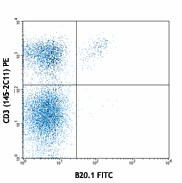
-

C57BL/6 mouse splenocytes stained with CD3 (145-2C11) PE and B20.1 FITC
| Cat # | Size | Price | Quantity Check Availability | Save | ||
|---|---|---|---|---|---|---|
| 127805 | 50 µg | $77 | ||||
| 127806 | 250 µg | $221 | ||||
The TCR alpha (α) chain complexes with the TCR beta (β) chain to form the T cell receptor in 95% of T cells, whereas the remaining 5% of T cells express gamma and delta chains (γ/δ). TCR Vα2 is a distinct TCR subfamily found in mice having the a, b, and c haplotypes.
Product DetailsProduct Details
- Verified Reactivity
- Mouse
- Antibody Type
- Monoclonal
- Host Species
- Rat
- Immunogen
- Soluble TCR from mouse CTL clone KB5-C20
- Formulation
- Phosphate-buffered solution, pH 7.2, containing 0.09% sodium azide.
- Preparation
- The antibody was purified by affinity chromatography, and conjugated with FITC under optimal conditions.
- Concentration
- 0.5 mg/ml
- Storage & Handling
- The antibody solution should be stored undiluted between 2°C and 8°C, and protected from prolonged exposure to light. Do not freeze.
- Application
-
FC - Quality tested
- Recommended Usage
-
Each lot of this antibody is quality control tested by immunofluorescent staining with flow cytometric analysis. For flow cytometric staining, the suggested use of this reagent is ≤0.25 µg per million cells in 100 µl volume. It is recommended that the reagent be titrated for optimal performance for each application.
- Excitation Laser
-
Blue Laser (488 nm)
- Application Notes
-
The B20.1 antibody recognizes most members of the Va2 TCR subfamily in mice having the a, b, and c haplotypes.
-
Application References
(PubMed link indicates BioLegend citation) - Product Citations
-
- RRID
-
AB_1134186 (BioLegend Cat. No. 127805)
AB_1134186 (BioLegend Cat. No. 127806)
Antigen Details
- Distribution
-
On a subset of T cells
- Function
- In combination of V β, Vα recognizes MHC/peptide complex on the antigen-presenting cells.
- Interaction
- Associate with Vβ and CD3 complex to form TCR complexes expressing on cell surface.
- Ligand/Receptor
- TCR recognizes MHC/peptide complex
- Cell Type
- T cells
- Biology Area
- Adaptive Immunity, Immunology
- Molecular Family
- TCRs
- Antigen References
-
1. Kubo RT, et al. 1989. J. Immunol.. 142:2736.
2. Pircher H, et al. 1992. Eur. J. Immunol. 22:399. - Gene ID
- 21473 View all products for this Gene ID
- UniProt
- View information about TCR Valpha2 on UniProt.org
Related Pages & Pathways
Pages
Other Formats
View All TCR Vα2 Reagents Request Custom Conjugation| Description | Clone | Applications |
|---|---|---|
| Purified anti-mouse TCR Vα2 | B20.1 | FC |
| Biotin anti-mouse TCR Vα2 | B20.1 | FC |
| FITC anti-mouse TCR Vα2 | B20.1 | FC |
| PE anti-mouse TCR Vα2 | B20.1 | FC |
| APC anti-mouse TCR Vα2 | B20.1 | FC |
| Alexa Fluor® 647 anti-mouse TCR Vα2 | B20.1 | FC |
| PerCP/Cyanine5.5 anti-mouse TCR Vα2 | B20.1 | FC |
| Pacific Blue™ anti-mouse TCR Vα2 | B20.1 | FC |
| APC/Cyanine7 anti-mouse TCR Vα2 | B20.1 | FC |
| Alexa Fluor® 488 anti-mouse TCR Vα2 | B20.1 | FC |
| PE/Cyanine7 anti-mouse TCR Vα2 | B20.1 | FC |
| Brilliant Violet 421™ anti-mouse TCR Vα2 | B20.1 | FC |
| Alexa Fluor® 700 anti-mouse TCR Vα2 | B20.1 | FC |
| PE/Dazzle™ 594 anti-mouse TCR Vα2 | B20.1 | FC |
| TotalSeq™-C0981 anti-mouse TCR Vα2 | B20.1 | PG |
| TotalSeq™-A0981 anti-mouse TCR Vα2 | B20.1 | PG |
| Spark Red™ 718 anti-mouse TCR Vα2 (Flexi-Fluor™) | B20.1 | FC |
| Spark Blue™ 574 anti-mouse TCR Vα2 (Flexi-Fluor™) | B20.1 | FC |
| Spark Blue™ 550 anti-mouse TCR Vα2 (Flexi-Fluor™) | B20.1 | FC |
Customers Also Purchased
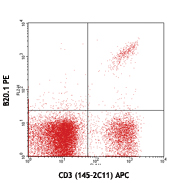
Compare Data Across All Formats
This data display is provided for general comparisons between formats.
Your actual data may vary due to variations in samples, target cells, instruments and their settings, staining conditions, and other factors.
If you need assistance with selecting the best format contact our expert technical support team.
-
Purified anti-mouse TCR Vα2
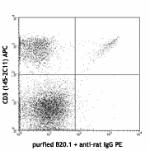
C57BL/6 splenocytes stained with CD3 (145-2C11) APC and puri... -
Biotin anti-mouse TCR Vα2
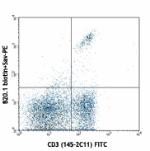
C57BL/6 mouse splenocytes stained with CD3 (145-2C11) FITC a... -
FITC anti-mouse TCR Vα2
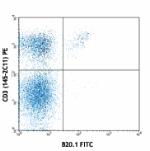
C57BL/6 mouse splenocytes stained with CD3 (145-2C11) PE and... -
PE anti-mouse TCR Vα2
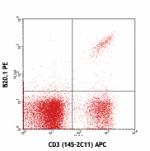
C57BL/6 splenocytes stained with 145-2C11 (CD3) APC and B20.... -
APC anti-mouse TCR Vα2
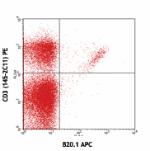
C57BL/6 splenocytes stained with 145-2C11 (CD3) PE and B20.1... -
Alexa Fluor® 647 anti-mouse TCR Vα2
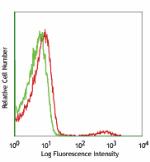
BALB/c splenocytes stained with B20.1 Alexa Fluor® 647 -
PerCP/Cyanine5.5 anti-mouse TCR Vα2

C57BL/6 splenocytes were stained with CD3 APC and TCR Va2 (C... -
Pacific Blue™ anti-mouse TCR Vα2
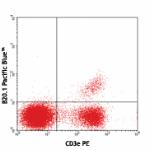
C57BL/6 mouse splenocytes stained with B20.1 Pacific Blue&tr... 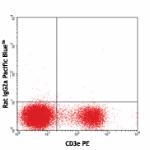
C57BL/6 mouse splenocytes stained with rat IgG2a, λ P... -
APC/Cyanine7 anti-mouse TCR Vα2

C57BL/6 mouse splenocytes were stained with CD3 PE and anti-... -
Alexa Fluor® 488 anti-mouse TCR Vα2
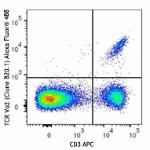
C57BL/6 mouse splenocytes were stained with CD3 APC and anti... 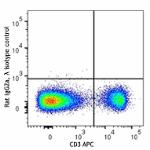
-
PE/Cyanine7 anti-mouse TCR Vα2

C57BL/6 mouse splenocytes were stained with CD3 APC and anti... -
Brilliant Violet 421™ anti-mouse TCR Vα2

C57BL/6 mouse splenocytes were stained with CD3ε PE and anti... -
Alexa Fluor® 700 anti-mouse TCR Vα2

C57BL/6 mouse splenocytes were stained with CD3ε PE and anti... -
PE/Dazzle™ 594 anti-mouse TCR Vα2

C57BL/6 mouse splenocytes were stained with CD3ε APC and ant... -
TotalSeq™-C0981 anti-mouse TCR Vα2
-
TotalSeq™-A0981 anti-mouse TCR Vα2
-
Spark Red™ 718 anti-mouse TCR Vα2 (Flexi-Fluor™)
-
Spark Blue™ 574 anti-mouse TCR Vα2 (Flexi-Fluor™)
-
Spark Blue™ 550 anti-mouse TCR Vα2 (Flexi-Fluor™)
 Login/Register
Login/Register 









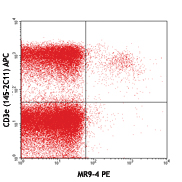





Follow Us